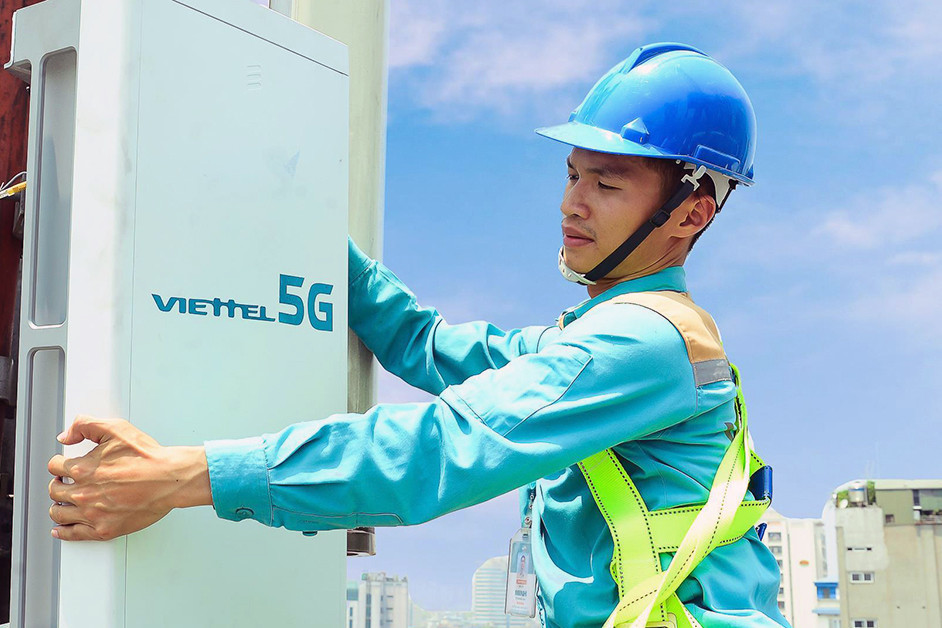As the nation marks the 79th anniversary of the Information and Communication Technology (ICT) sector, efforts are intensifying to position Vietnam at the forefront of global technological innovation.
Choosing the right technology and leading the way

When Vietnam deployed the 2G GSM network, only a few Nordic countries had implemented this technology globally. Photo: VT
The early 1990s marked a pivotal period for Vietnam's postal and telecommunications industry, laying the groundwork for rapid advancement. During this time, foreign investment surged, and the demand for mobile communication services began to emerge, particularly in Ho Chi Minh City.
The General Department of Posts and Telecommunications started exploring mobile communications in Vietnam, engaging with partners like SingTel, Alcatel, Siemens, and Ericsson.
Between 1991 and 1993, digital cellular mobile technology GSM was being deployed extensively across Europe. However, this technology was still in its early stages and had not yet been widely commercialized.
The General Department of Posts and Telecommunications faced a dilemma: while the need for mobile communication was growing, the question remained as to which technology would best suit Vietnam’s needs.
At the time, 95-97% of the world’s telecommunications networks were analog, with manufacturers continuing to produce these devices. Although some countries were beginning to transition to digital technology and were ready to sell it, Vietnam's limited resources and underdeveloped telecommunications sector required careful consideration. After extensive discussions and analysis, the decision was made to leapfrog into digital technology.
Mr. Mai Liem Truc, former head of the General Department of Posts and Telecommunications, explained that the decision to adopt digital technology was driven by a desire to modernize and create a uniform network. As a result, the mobile communication technology selected was GSM.
Vietnam deployed the 2G GSM network when only a few Nordic countries had adopted this technology. This decision was challenging due to commercialization difficulties, unfinished terminal equipment, and extremely high costs - up to thousands of dollars per unit.
Some experts had advocated for global satellite mobile technology, which offered the advantage of being usable anywhere in the world, although the terminal devices were larger. However, the General Department ultimately chose the GSM network, partly because it allowed for better management. This cautious approach later proved beneficial when mobile satellite technology failed to take off.
Mr. Mai Liem Truc emphasized: “When Vietnam deployed the 2G GSM network, only a few countries in Northern Europe were doing so. Therefore, Vietnam was among the first countries in the world to deploy 2G.”
Vietnam among top 5 countries to produce 5G equipment
Vietnam’s bold decision to lead in technology selection revolutionized its telecommunications sector in the 1990s, setting a precedent for future generations.
The Ministry of Information and Communications reported that on January 17, 2020, the first video call using a 5G connection on a gNodeB transmitter and receiver developed by Viettel was successfully made. With this achievement, Vietnam officially mastered 5G technology.
Viettel's successful testing of the 5G network in the lab in 2019 placed Vietnam among the top five countries that had successfully tested 5G. Furthermore, Viettel's production of 5G terminal equipment positioned the company among the top six telecommunications companies globally, alongside industry giants such as Ericsson, Samsung, and Huawei.
Notably, Viettel is the only telecommunications operator among these six companies that both operates a network and researches and produces equipment.

Viettel has tested 5G technology with speeds reaching up to 4.7Gbps, which is 40 times faster than 4G and more than twice the current 5G speeds. Photo: VT.
As of September 2021, Viettel had tested 5G technology reaching speeds of up to 4.7Gbps - 40 times faster than 4G and more than twice the current 5G speed - making Viettel one of the fastest telecommunications networks in Asia.
Recently, the IT and Communication Industry Department (Ministry of Information and Communications) recognized Viettel's products, including 5G telecommunications network equipment (5G radio wave transmission network gNodeB, core network, transmission equipment), and chips used in 5G devices. These products are now eligible for preferential policies under the law for key IT product production.
Viettel has strategically begun replacing imported devices with locally produced ones, using an entirely Vietnamese-made core telecom network system. This move contributes to Vietnam's technological independence, reduces reliance on foreign sources, and conserves foreign currency.
This technological mastery has significant national implications, positioning Vietnam as a leader in global technology. This achievement is essential for the country’s economic and social development while ensuring national security.
Vietnam aims to lead in 6G
As the world gradually adapts to 5G technology, the forward-looking eyes of the technology sector are turning toward 6G. Although still largely conceptual and not expected to be commercially deployed until at least 2030, 6G promises to redefine the limits of wireless technology, offering faster speeds, lower latency, and higher reliability.
Consequently, many countries are actively investing resources in 6G research and development, aiming to maintain a pioneering position in this revolutionary technology. Among these countries are China, South Korea, Japan, the USA, and the European Union.
In Vietnam, the Ministry of Information and Communications recently decided to establish a 6G Development Group to evaluate, test, and promote the research and development of 6G mobile technology.
This task force will focus on researching and reviewing regulatory documents to advance 6G technology, including equipment evaluation, testing, and promoting deployment.
Deputy Minister of Information and Communications Pham Duc Long stated that many global powers are currently researching 6G, and Vietnam's goal is to keep pace with the world in 6G research, production, and deployment.
The Deputy Minister emphasized: “Vietnam will research and contribute to global 6G standards. The Ministry of Information and Communications and businesses will collaborate to research and promote this technology. The state will invest in laboratories for businesses to research and produce 6G equipment. Without these labs, it would be difficult to advance 6G research. In addition to collaborating domestically with experts, universities, and research institutes on 6G, Vietnam will also invite foreign experts to contribute to our 6G research.”
“The opportunity is available to all countries, but only those who seize it will succeed. Today, we lay the foundation so that in 10 years, we may be successful. Without today’s efforts, we will have nothing in 10 years. If we can research and produce 6G equipment, it will create a new industry for the country,” Long added.


